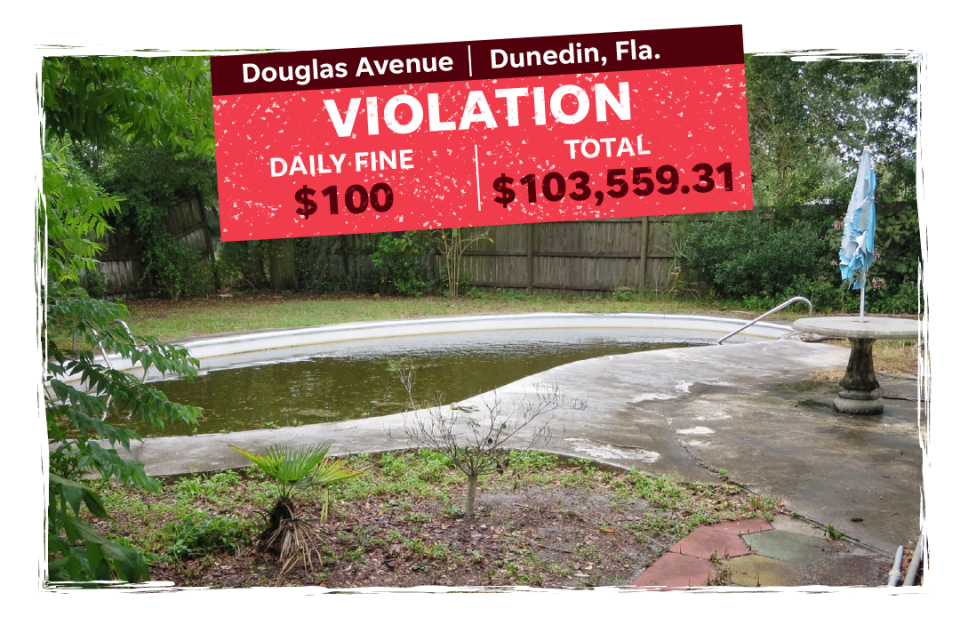Florida city, under fire for imposing massive fines on homeowners, drops lawsuit against woman
WASHINGTON – The city of Dunedin, Florida, which has been under scrutiny for massive fines lodged against homeowners, has dismissed a lawsuit against a woman who faced more than $100,000 in code enforcement fines at a house she no longer owned.
The city said in a brief court filing late Monday that it is voluntarily dismissing the lawsuit against Kristi Allen, a former Dunedin resident who was fined $103,559 – about twice her yearly income – over a dirty swimming pool and overgrown vegetation at a house she said she left to the bank eight years ago.
The dismissal comes about a month after USA TODAY chronicled Allen's story and the city's history of imposing exorbitant fines – sometimes tens of thousands of dollars at a time – for violating laws that prohibit grasses taller than 10 inches, recreational vehicles parked on streets at certain hours, sidings and bricks that don't match or dirty pools. Over the past 5½ years, the city has collected nearly $3.6 million in fines while its revenue grew.
Dunedin's lawyers did not explain why they're dropping the lawsuit, which was filed late last year in order to collect the fines from Allen. It also is not clear if the city still intends to collect the fines through other means. The city and its attorneys did not respond to requests for comment Tuesday.
Excessive fines: A Florida woman was fined $100,000 for a dirty pool and overgrown grass. When do fines become excessive?
Across the country, fines have become a reliable source of revenue for cash-starved cities, and they have become a big – and rapidly growing – business for local governments. States, cities and counties collected $15.3 billion in fines and forfeitures in 2016, according to the most recent financial data collected by the U.S. Census Bureau. That's a 44% jump from a decade earlier.
In February, the Supreme Court ruled unanimously that excessive fines are unconstitutional – the first constraint by a federal court on how much money local governments can charge people for everything from speeding to overgrown lawns. But the ruling, while lauded by civil rights groups, left it up to cities and states to determine when a fine is considered excessive.

Several homeowners, including Allen, have accused the city of overzealous code enforcement practices and said they did not know they even owed anything until daily fines of $100 to $500 had accumulated. Others said they were fined even as they tried to fix the violations.
Ron Sachs, a public relations expert the city hired amid controversy over another homeowner who was fined $30,000 because of an overgrown lawn, said earlier that fines Dunedin imposes are neither excessive nor abusive. Those who end up owing the city thousands of dollars in fines are homeowners "who have chosen to stay in violation," Sachs said. His company no longer represents the city.
Dunedin officials talked about the need to assess their code enforcement practices during a city commission workshop last month, amid negative media coverage over its fines. Jennifer Bramley, the city manager, brought up the possibility of placing a cap on fines and the need for "a better balance" between penalties and violations that are not life-threatening. Bramley also cautioned that the city needs to act methodically and carefully, adding the majority of residents favor the current code enforcement process.
Loading...
Heather Gracy, one of the city commissioners, suggested bringing in an independent auditor to examine the city's practices, including rules on repeat code violators. In Dunedin, a repeat code violator can be charged $500 a day even without notice.
Officials also said that Dunedin had been unfairly portrayed and criticized in the media and that coverage has resulted in death threats and obscene phone calls.
"There's obviously something here that folks are reacting to that we're having to deal with," Mayor Julie Bujalski said during the workshop. "To take action is not – certainly doesn't make us look like we're listening. Inaction is a problem. Taking some action and evaluating things, I think, is important that we do that."
It was not immediately clear what specific actions, if any, the city has taken to examine its code enforcement practices.
In Allen's case, she said she did not know she owed anything until fall of last year – seven years after she moved out of her Dunedin home – when she received a letter from the city attorney telling her she owed $92,600 in fines over overgrown vegetation and a stagnant swimming pool. That amount did not include interest and other administrative charges. Three months later, in December 2018, the city sued, setting off a legal fight over how local governments use their power to impose heavy fines on citizens.

Allen bought her Dunedin home in 2005. But a few years later, Allen, a 38-year-old radiologic technologist, took a pay cut and lost her house in the wave of foreclosures that swept over Florida and the country. In 2011, she signed an agreement with the U.S. Bank National Association allowing the foreclosure and moved out. But, unbeknownst to her, the foreclosure would not be finalized for another three years, and her name would remain in county property records. Meanwhile, the house was vacant. Brown palm fronds littered the overgrown backyard, the swimming pool turned green, and the house became a neighborhood nuisance.
City officials sent notices to Allen, telling her of the problems. The letters were mailed to Allen at her Dunedin house and were returned undeliverable with no forwarding address. The city later imposed a fine of $100 a day, and the amount accumulated for two more years – even after the foreclosure was finalized in late 2014 and Allen no longer owned the house.
Allen was not immediately available for comment on Tuesday. But Ben Hillard, her attorney, said he wasn't surprised that the city dismissed the case. Hillard said he believes the city knowingly mailed notices to Allen's old address, fully aware that she was not receiving them and, therefore, was not aware she owed any fines.
The city's attorneys had argued in court records that Allen should pay, citing a state statute saying a lien the city placed on the house where the violation occurred applies to other personal property Allen owned. In Florida and elsewhere, unpaid fines can be attached to someone's property through liens, allowing cities to foreclose and take the property to collect what they're owed. Because Allen no longer owns the house, the city sought other ways to collect.
The city dismissed the lawsuit without prejudice, meaning officials can refile the lawsuit if they choose to do so.
This article originally appeared on USA TODAY: Dunedin, Florida drops lawsuit against woman over code violation fines

